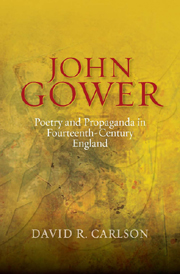Book contents
- Frontmatter
- Contents
- Abbreviations and Citation Forms
- Introduction: Gower in History
- I Fourteenth-Century Panegyric Verse and Official Writing
- 1 Official Verse: The Sources and Problems of Evidence
- 2 The State Propaganda
- 3 Occasions of State and Propagandistic Verse in Mid-Century
- 4 Walter Peterborough's Victoria belli in Hispania (1367) and its Official Source
- 5 Compulsion in Richard Maidstone's Concordia (1392)
- II Gower's State-Official Late Poetry
- Bibliography
- Index
- VOLUMES ALREADY PUBLISHED
1 - Official Verse: The Sources and Problems of Evidence
from I - Fourteenth-Century Panegyric Verse and Official Writing
Published online by Cambridge University Press: 05 February 2013
- Frontmatter
- Contents
- Abbreviations and Citation Forms
- Introduction: Gower in History
- I Fourteenth-Century Panegyric Verse and Official Writing
- 1 Official Verse: The Sources and Problems of Evidence
- 2 The State Propaganda
- 3 Occasions of State and Propagandistic Verse in Mid-Century
- 4 Walter Peterborough's Victoria belli in Hispania (1367) and its Official Source
- 5 Compulsion in Richard Maidstone's Concordia (1392)
- II Gower's State-Official Late Poetry
- Bibliography
- Index
- VOLUMES ALREADY PUBLISHED
Summary
The Case of Robert Baston
The well-attested early fourteenth-century effort went wrong badly. For his invasion of Scotland in 1314, the Plantagenet King of England Edward II, like the great Macedonian Alexander before him, took a contemporary Choerilus along in train, ostensibly “the famousest prosodist in all England,” a man named Robert Baston, whose career in poetry is in fact otherwise unknown, despite the chronicler's assertion of his magnitude. The English king
famosiorem metristam in universo regno Anglie, videlicet quemdam fratrem Carmelitam, secum adduxit, ut de triumpho suo de Scotis adipiscendo ad ipsorum dedecus metra compingeret, et ad memoriale sempiternum Scotis sic per eum, ut putabat, devincendis relinquenda.
[took in train with him the famousest prosodist in all England, a Carmelite, to fashion verses of his triumph over the Scots, in disparagement of them, to bequeath a sempiternal monument to the conquest of the Scots that he was expecting to achieve.]
But then the Scots laid hold of Edward's poet, and, having already humiliated Edward and the English on the field of battle at Bannockburn, embarrassed him and them by these other, evidently concomitant means. The Scots put the English “metrista” Baston to work writing verses – “absque ambiguitate,” moreover (since the Scots knew something already about English poets) – instead in praise of Scottish valour, making mock of the English, by way of his ransom from captivity: “et pro redempcione sua compulsus est.”
- Type
- Chapter
- Information
- Publisher: Boydell & BrewerPrint publication year: 2012

